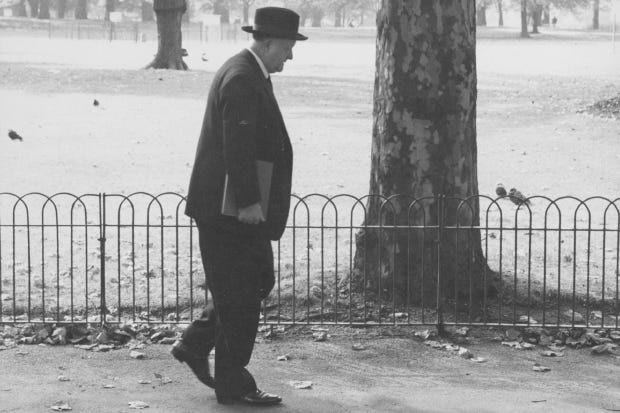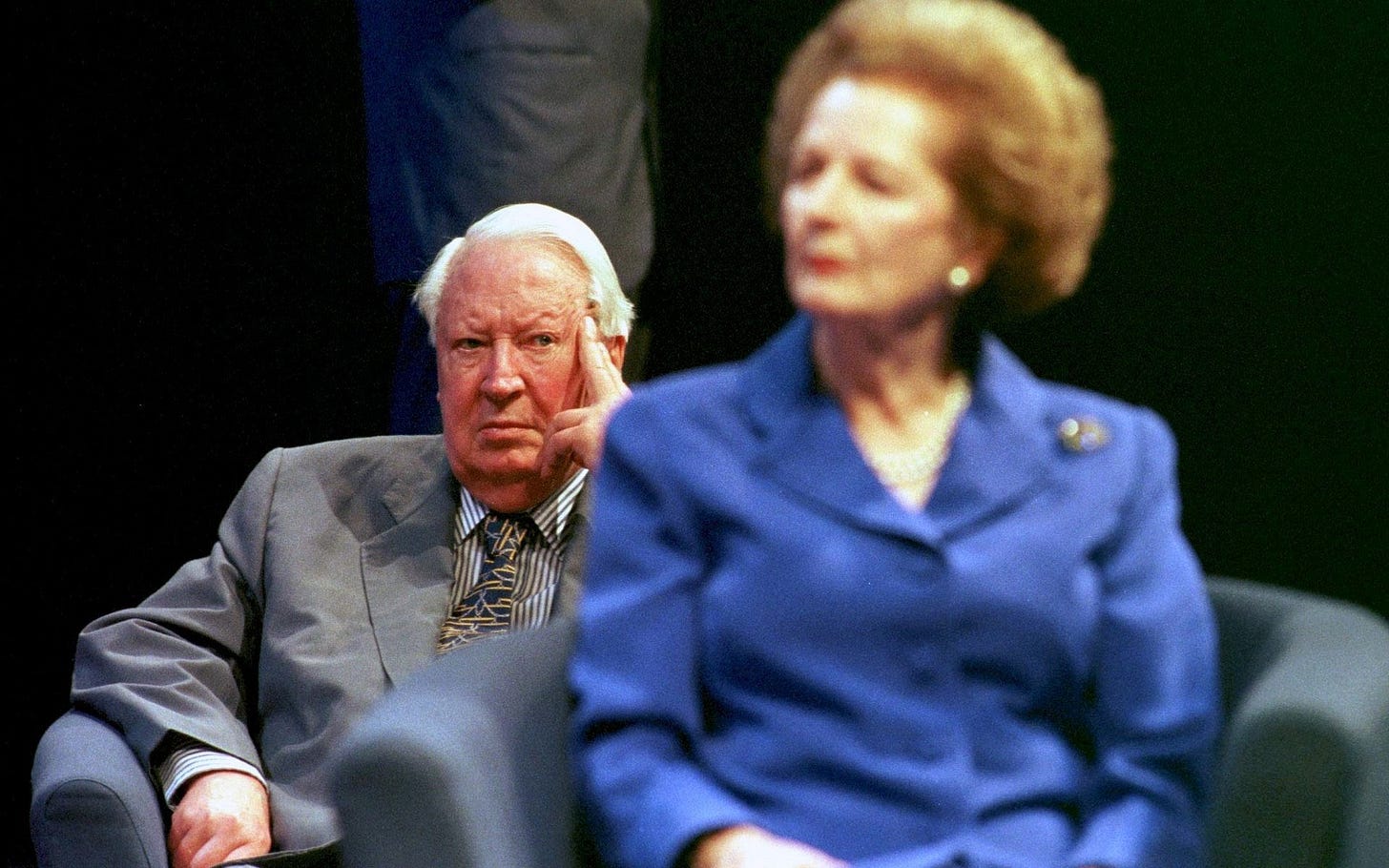A common but lazy trope of British politics is the apparent conflict between ‘One Nation Conservatism’ and ‘Thatcherite’ Toryism. As is often the case with political labels, ‘one nation’ has been promiscuously and thoughtlessly applied to a wide range of different and inconsistent traditions, but the connecting link has been the application of the term to anything which can vaguely be described as left-wing within the wider framework of the Conservative Party: environmentalism, social liberalism, a mixed economy, a rehabilitative penal policy, generous welfare benefits, enthusiasm for mass immigration. In 2019 a caucus of Conservative Party MPs even used the term to describe their attempt to oppose Brexit.
The core of this analysis asserts that the Conservative Party was true to its ‘one nation’ roots during the period of the postwar-consensus, with its greatest exponent being Harold Macmillan, who established a working compromise between capital and labour, and championed a mixed economy which secured full employment with rising living standards. This settlement was then dismantled by Margaret Thatcher, who ushered in an age of selfish individualism and Manchester Liberalism. According to this analysis, any Tory with a social conscience, or who regrets the deindustrialisation of the modern economy, ought to look back to the one nation tradition of Macmillan with fondness, whilst regretting the reforms of the Thatcher era.
The superficiality of this analysis has distorted the thinking of the modern Conservative Party - on both sides. Defenders of the Thatcherite reforms have been unwilling to consider whether any criticism of her reforms were valid; opponents have recognised the great damage which her reforms created, but have fallen into the opposite error of defending the post-war consensus which she dismantled. The tragedy is that neither analysis has anything to do with the one nation tradition.
One Nation Toryism
Deriving from Disraeli, the term ‘one nation’ was historically used to describe efforts to ensure that the benefits of an advanced civilisation were extended to all. This was not the same as state control of the economy, nor the imposition of equality of outcome, nor the weakening of social institutions. The focus instead was on substantial public works in infrastructure and in health, alongside protections of the individual against the power both of the state and of commercial or other enterprises. Disraeli’s second ministry was a model for One Nation Toryism: establishing modern sanitary codes and a system of inspectors to enforce them; setting minimum standards for public and private housing, as well as food and drink quality; bringing disputes between trade unions and employers fully within the civil and not the criminal law; reducing the number of working hours permitted per day; enabling compulsory purchases of slum areas by councils for the purposes of commercial development. By the end of Disraeli’s ministry the Liberal-Labour MP Alexander Macdonald was able to declare that “The Conservative party have done more for the working classes in five years than the Liberals have in fifty.” These social reforms were firmly in the ‘social tory’ tradition, previously exemplified by Lord Shaftesbury, who in an earlier generation had distinguished himself for his reforms of the lunacy laws, child employment, animal welfare, and the reform of unhealthy dwellings.
Since Disraeli’s premiership, Toryism has applied itself to this one nation ideal, even if the term was not in vogue. The efforts of the Tory party in office were to extend the realities of a property-owning democracy, whilst enabling the development of public works and the foundations of the welfare state. When the ‘one nation’ label was revived in 1950, it was by a group of young MPs looking at how a welfare state could be reconciled with a capitalist society - of which a core proposition was the reintroduction of a means test. How, then, did the phrase come to be used as a lazy shorthand for left-wing conservatism?
Failure of the Post-War Consensus

The false dichotomy between what can be regarded as the Macmillanite or Thatcherite traditions in the current Tory Party is a legacy of the deep schism within the party in the 1970s and ’80s. During that period the term ‘one nation’ became a self-description for those within the party who continued to defend the post-war economic settlement which Margaret Thatcher was challenging.
This post-war settlement has been described as ‘Butskellism’; the consensus between the Conservative Chancellor R.A. Butler and his Labour counterpart Hugh Gaitskill over the foundations of the economy. This phrase overstates how much agreement there was between the parties in the early 1950s. During R.A.B Butler’s Chancellorship the Conservative Party moved a good way toward repudiating at least part of the edifice of state control which had been established by Atlee: rationing was brought to an end, and taxation and state subsidies reduced.
It was during the Macmillan premiership that a pattern became established which would endure until the 1980s, and enjoyed cross-party support. It consisted of considerable nationalisation of key industries; trade union immunities; national and local planning; subsidisation of failing businesses; high rates of taxation and expenditure; wage and price controls; and inflation used as a mechanism to hold down rates of unemployment. The architecture of this political consensus sustained itself throughout the governments of Macmillan, Wilson, Heath, and Callaghan, during whose tenure it finally crumbled. The Three Day Week of ’74, the IMF bailout of ’76, and the Winter of Discontent of ’78-79 spelt the end. This was recognised on the left just as fully as it was on the right: Tony Benn, Roy Jenkins, and Denis Healy all recognised (from their particular standpoints) that the existing settlement had failed, as surely as Keith Joseph and Geoffey Howe were to do.
The Thatcherite Revolution
The claim that defenders of the post-war settlement were inheritors of the ‘one nation’ tradition arose in consequence of the evident damage which many of Thatcher’s reforms did to so many communities. Yet the nature of the post-war settlement meant that such damage was almost unavoidable: it was baked into the nature of the faulty policies which had dominated since 1958.
By the 60s and 70s, successive governments had allowed significant portions of the British economy to become dependent on subsidy, particularly in manufacturing and heavy industry. This could only be sustained when it represented very few businesses, and a small proportion of the wider economy. If the ordinary processes of capitalism had been allowed to run naturally then labour would slowly and organically have moved from diminishing industries to thriving industries. But by attempting to artificially prevent temporary unemployment in select sectors, the proportion of the economy so maintained grew with every year. By the latter half of the 20th century the amount of government expenditure on loss-making industries continued to grow, whilst the unemployment and social damage which would follow the withdrawal of these subsidies accrued.
This same pattern was repeated with inflation. Harold Macmillan had been willing to use an inflationary policy to reduce unemployment; but this was only a temporary fix. As the effect of the boom wore off and the unemployment rate continued to rise, further inflationary policies were pursued to try and hold the unemployment rate down. This created a bitter cycle: the rate of inflation continued to grow, yet so did the unemployment figure.
In 1955 unemployment was at only 215,000 (1% of the working population), with inflation consistently in the low digits. By the early 1970s unemployment hit 1 million (4%), before reaching 1.5 million (5.5%) in 1978. During this time inflation had continued to grow, being consistently double-digits throughout the 1970s - and often surpassing 20%. Whereas the unemployment which would have followed from an anti-inflationary ‘Thatcherite’ policy in 1958 would have been low and temporary, by the 1970s the consequences of withdrawing state subsidies and reducing inflation were bound to cause much deeper levels of unemployment across much wider sectors. After Thatcher’s reforms, unemployment peaked at 3.3 million. Had the Thatcherite reforms been postponed any longer then the inflation and unemployment would have continued to grow, and any later attempt to fix them would have been even more destructive.
The damage caused to communities across the country by the Thatcherite treatment was itself exacerbated by the effects of the social reforms of the 1960s. The impact of widespread unemployment was devastating in communities already suffering with the rise in fatherlessness, drug use, crime, and gambling. Those lamenting these consequences came to associate the policies with selfish individualism, contrasted with a community minded economic programme.
Economic liberalism in the Thatcherite sense clearly is deficient for a One Nation Tory. There may not be any requirement to defend the post-war economic consensus, but clearly we have to be concerned for the moral, material, and spiritual welfare of our fellow citizens. One component of this is an identified economic or industrial strategy. The negative element of the Thatcherite revolution was necessary: inflation needed to be squeezed out of the economy, trade union power needed to be curbed; the price mechanism needed to be reintroduced; the discipline of profit-and-loss needed to be restored; taxation needed to be reduced. The tragedy and the failure of that revolution was Thatcher’s unwillingness to establish any positive alternative to the failed consensus. Thatcherism can be described as laissez-faire, not in the crude sense of a lack of public provision for welfare, education, or health; but in the literal sense of an indifference to the direction in which the economy was heading. Indeed, this element of Thatcher’s economic strategy was explicit. She didn’t regard it as the business of politicians to determine what a healthy economy ought to look like; and if all capital investment went into a service industry at the expense of manufacturing - so be it. Our reliance on Chinese manufacturing during the Covid pandemic - and our continuing reliance on foreign fuel - are economic vulnerabilities which a One Nation Tory ought to repudiate, but which neoliberal economics struggles to acknowledge.
Margaret Thatcher’s repudiation of the post-war settlement resulted in wide scale and chronic unemployment, and exacerbated the deindustrialization of our economy and the entrenched social problems which followed from both. No positive economic programme was put in place as an alternative. Her critics within the party - such as Ian Gilmour, Ted Heath, and Jim Prior - claimed that they represented a community minded one nation tradition in contrast to her economic liberalism; but offered no recognition of the severe economic problems with which she was grappling, appearing to believe that all was well. Despite the defenders of this failed economic settlement retrospectively defining themselves as ‘one nation’ tories, the post-war economic consensus was a temporary compromise between political parties, at a time in global history when state intervention and planning appeared attractive. It had nothing to do with the longer tradition of one nation Toryism as that had been understood since Disraeli in the 19th century.





